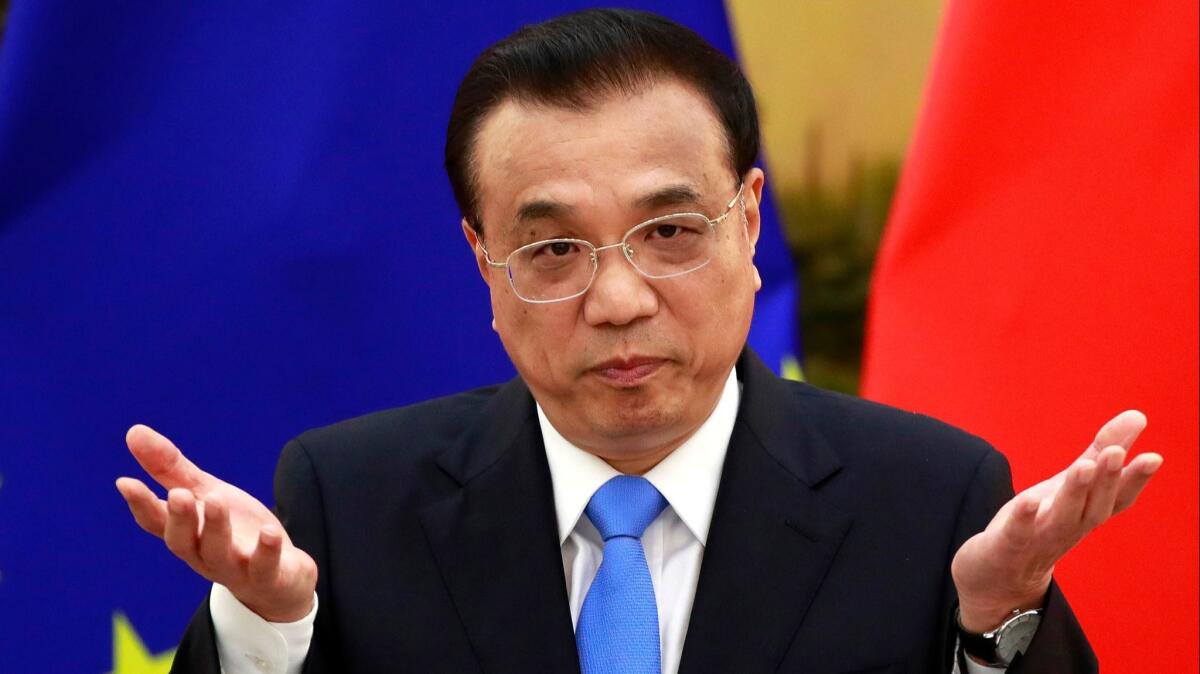China challenges fairness of U.S. tariffs and asks World Trade Organization to intervene

- Share via
Reporting from Beijing — China on Monday presented itself as a bastion of international order and global rules on trade while announcing its filing of a World Trade Organization challenge against a threat of $200 billion more in tariffs by the United States.
A Chinese government spokeswoman said fair trade called for international rules that were made collectively. The U.S., however, had helped shape WTO rules for its own benefit, she said.
“Who would believe that the rule maker would make rules to serve others rather than itself?” the government spokeswoman, Hua Chunying, said at a news conference in Beijing. “Fairness is anything but one party calling the shots and dictating rule making to serve and maximize its own interests at the cost of justice and equality for others.”
The proposed import tariffs on the $200 billion in Chinese goods, identified by President Trump last week, would not take effect until at least September. The proposal came after China retaliated against $34 billion in U.S. tariffs on its goods, effective early this month, with its own tariffs on American goods.
The initial U.S. tariffs covered mostly machinery and industrial parts, while China’s retaliation meant tariffs primarily on American farm products and other foods.
Ratcheting up trade war tensions Monday, U.S. Trade Representative Robert Lighthizer said the Trump administration would make its own complaint to the WTO about Chinese retaliatory tariffs, along with similar complaints against Europe, Canada, Mexico and Turkey.
Lighthizer said that the United States’ imposition of tariffs was justified, whereas the retaliatory measures by China and others were not. He said the retaliations punished U.S. farmers and workers.
While in Europe in recent days, Trump referred to European allies as “foes” and Russian President Vladimir Putin as someone he could get along with. Despite U.S. plans to file a WTO complaint, the administration has argued that the organization, which handles disputes, is incapable of dealing with what officials call unfair Chinese trade practices.
European leaders also criticize Chinese trade practices, which include massive state support for certain firms; restrictions on foreign firms doing business in China, and a requirement that many high-tech firms share their technical innovations with Chinese partners, in return for access to China’s vast market.
But instead of joining with allies to pressure China to reform its approach, Trump has been divisive and left the transatlantic allies weaker, critics said.
“Trump has obviously divided that alliance and you have Europe now having a separate kind of relationship with China and the global consensus on trade and rules and norms being fragmented,” said China analyst Kerry Brown, director of the Lau China Institute at King’s College London.
European Council President Donald Tusk on Monday called on leaders of Europe, the U.S., China and Russia to work together to avoid a trade war at the opening of a summit between China and the European Union in Beijing.
“There is still time to avoid conflict and chaos,” he said.
China has threatened to match U.S. tariffs with similar measures, but its American imports amount to about $130 billion, whereas the United States’ imports from China exceed $500 billion — making it impossible for China to fully match the U.S. tariff for tariff.
China joined the WTO in 2001, integrating deeply into the global economy, a process some hoped would lead to the country becoming more open and democratic. Instead, China appears to be moving in the opposite direction, after the National People’s Congress in March abolished term limits, a move that could see President Xi Jinping stay in office indefinitely.
Hua said China was the largest trading partner for 120 nations and was the world’s largest market. Nations and firms that traded with China did so voluntarily because it was profitable, she said.
China is seeking to capitalize on the U.S.-European divide seen recently at the North Atlantic Treaty Organization summit in Brussels by wooing European leaders, trying to persuade them to adopt a joint approach to maximize pressure on the Trump administration to abandon a trade war.
But it has had limited success, with European leaders also calling for China to adopt a more open, market-oriented approach.
Chinese Premier Li Keqiang met European leaders Monday, after which they released a joint statement calling for more openness in world trade. It called on global leaders to work on “resisting protectionism and unilateralism and making globalization more open, balanced, inclusive and beneficial to all.”
Jean-Claude Juncker, president of the European Commission, called for just and fair global trade rules.
“If China wishes to open up it can do so,” Juncker said in Beijing. “It knows how to open up.”
More to Read
Sign up for Essential California
The most important California stories and recommendations in your inbox every morning.
You may occasionally receive promotional content from the Los Angeles Times.













